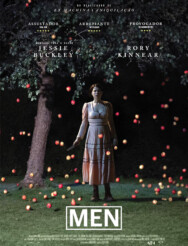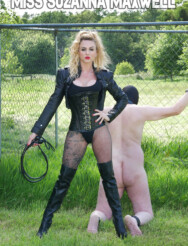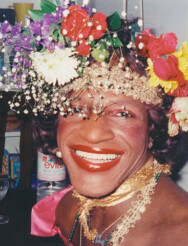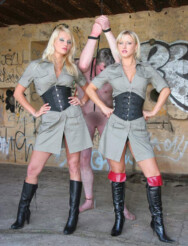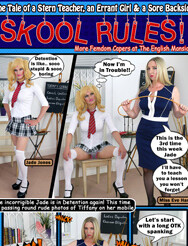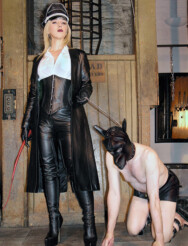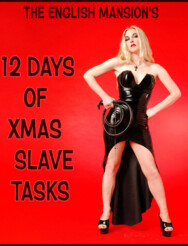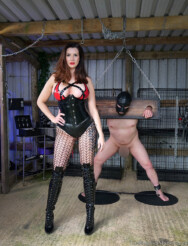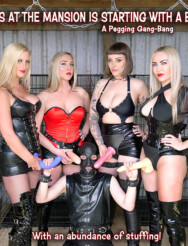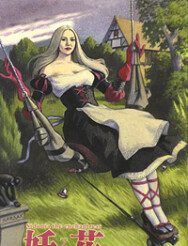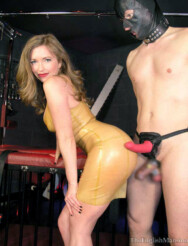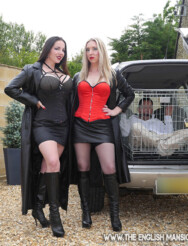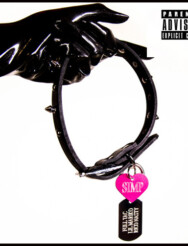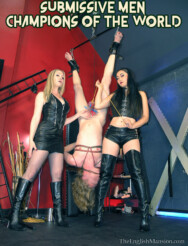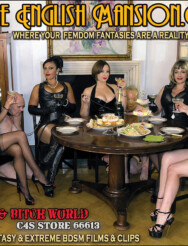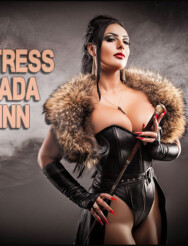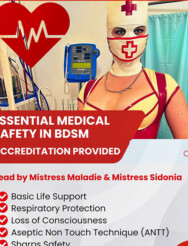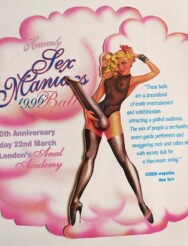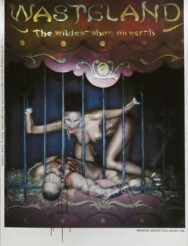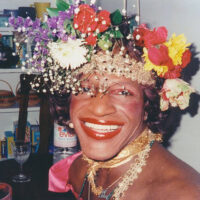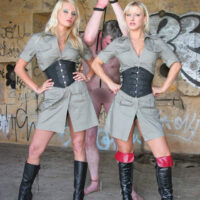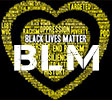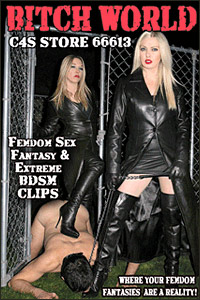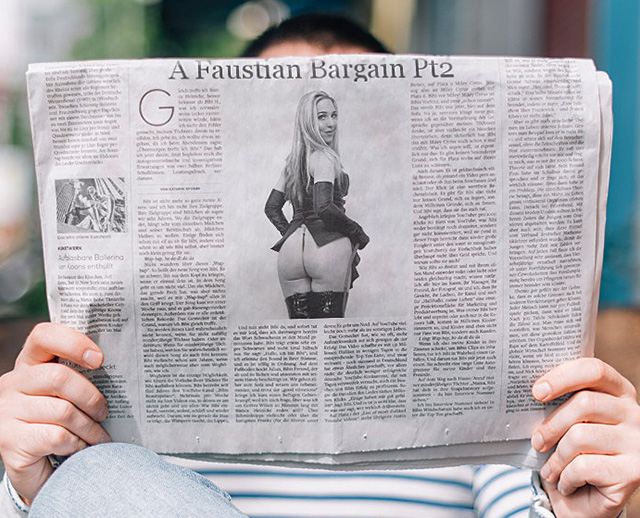 A Faustian Bargain
A Faustian Bargain
Putting The Media Into The Spotlight Pt2
In the first part of this article I gave my account of how as a working Mistress I was unwittingly turned into a sensational ‘shock story’. It is worth noting that in my case it was no exposé. I agreed to a magazine interview. Wanting to promote a more positive portrayal of sex work, I thought it was important to speak out honestly about my life. Unfortunately, I was manipulated into just the kind of negative stereotypical image I was trying to challenge. The more I talked to people about my experience the more I realised that others shared my sense of disillusionment. I found that many people involved in ‘fringe groups’ had happily agreed to some kind of interview thinking they could promote or defend their lifestyles but were left appalled at the way they were eventually presented. Like myself, we had all been quite naive about what we were letting ourselves into.
So now I want to put the media into the spotlight. I intend to examine our current relationship with both the public and the press. Looking especially at the new breed of tabloid television that has entered our living rooms. This kind of television relies on people from fringe groups to sustain it, sex-workers, swingers, S&M enthusiasts, body piercers, lesbians, gay men, transvestites & transexuals, naturalists etc. I will try to find out why we appear and what can we really achieve by agreeing to take part in these programmes.
Fetish, fetish everywhere
Today ‘fetish’ has become chic. We are surrounded by fetish images from rubber clad girls taking a break for a ‘Kit-Kat’ to cover girls in tight fitting PVC cat suits. The dominatrix is no longer an idea found in secret books and magazines but a post-feminist role-model. Rubber and leather fetish outfits adorn the catwalks of the world. Advertising and pop videos use both fetish fashion and iconic images to ‘enhance’ their product. Fetish equals naughty, sexy, sleek, post modern, technological and ultimately cool. Alongside this, art’s new avant-garde hits us with images of pickled animals, corpses, canned shit, in fact anything considered disturbing and shocking. Mainstream cinema has embraced ‘pulp films’ black, wry stories where we are humorously shown the most gruesome, bloody acts of violence. So in an environment where fetish is everywhere and shocking images bombard us daily it seems that the masses appear rather disinterested in ‘real’ SM. It has lost both its mystique and its shock value.
The Press
In the past the only relationship we had with the press was to find ‘perves’ regularly exposed in the tabloids. We all know the ridiculous eye-catching headlines. These are ‘shock stories!’ that are actually not that shocking and contain little independent, unbiased, factual reporting. Look closer at these stories, however, and a few alarming truths emerge. Most of the stories are full of double standards, they write as though affronted, yet titillate with emotive headlines and explicit photographs. Many of the stories are presented humorously. But beneath the smirks remember they are exploiting individuals’ personal and private lives. These often have devastating repercussions for those involved and can cause great emotional hurt. The tabloids are not really trying to combat immorality or protect the public. They are just hypocritical bigots – moral vigilantes who exploit individuals to sell their papers. But they still have a degree of power – ‘exposure’ is the only real threat that hangs over the heads of most fetishists in this enlightened time.
Things are changing however. In the last decade it appears there has been a cultural shift enabling more liberal attitudes towards sex. Society is now much more tolerant of alternative sexualities. Today we have a fetish industry catering to the needs of a more open-minded nation: fashion, fiction, equipment, films and magazines. Pop culture is obsessed with a transformation of the body and self through piercing and tattooing. The Internet is allowing fringe communities from around the world to come together. Perhaps we are all becoming more open in the whirlwind of the new millennium.
A New Breed of Tabloid Television
So with this liberal attitude and the advent of new channels fighting for viewers there has been an explosion in programmes about SEX. Here alternative sexualities are paraded on our televisions not as exposés but rather with the aid of those involved. There are chat shows like The Sex Files (Living) & UK Raw (Ch5), documentaries like Nick Broomfield’s Fetishes (CH4) & Strippers (Ch5). Light-hearted, magazine style shows like Euro-Trash (CH4) & British Sex (Sky 1). And of course an abundance of live debate shows like Kilroy (ITV) and Vanessa (BBC1). All these programmes rely on people prepared to bare all on national television. Suddenly journalists and researchers are now no longer looking for exposés but assure us they want to give us a sympathetic hearing and opportunity of recourse.
So where does this constant supply of willing participants come from? Many people who decide to ‘go public’ actually risk personal repercussions. So why do we take part in these interviews, debate programmes and documentaries? Perhaps because we want to try and make a difference. We feel that we can put our point of view across. We think we can explain that we are not weird or strange and show that we’re ordinary people. We want to demonstrate that we are articulate and do not fit into society’s stereotypes. We hope that we can defend our position and maybe even change what people think about us. We want to stand up and be counted! However, what do we actually achieve?
A great debate or just an excuse for a slanging match?
Recently a number of individuals from both the fetish and swinging scene appeared on ‘Michael Cole’ (Living), a daytime topic-based talk show. This particular programme was entitled ‘Swingers Hot to Swap’. I thought the panel on the show were great. They came across as intelligent, articulate and honest about their lives. The audience, however, were rude, aggressive and ignorant and really gave the panel a hard time. It was clear that they did not want to enquire about the panellist’s’ lifestyles, learn or ask questions, they were there to pass judgement. The panel was really putting up a fight and coming across very well. Two members of the audience, however, started really making offensive assertions, such as ‘where will this all end – will it be children next?’ This set the panel off and much shouting ensued. It seemed obvious that some members of the audience were plants. They were there to ensure contention leading to a good rumpus, which they achieved. I found this particularly disturbing and worrying. I felt the panel were abused and basically manipulated into having to defend themselves against absurd statements.
It is these so-called debate style programmes that concern me the most. They masquerade as informative forums for discussion, however they are nothing of the sort. The makers of these programmes use fringe groups such as S&M enthusiasts, swingers and sex workers for their perceived shock value. They always introduce the extremes within a particular subject. They say they want to put across a fair, balanced view but actually they just want a sensationalist issue to improve viewing figures. They contrive to mix their topic group with another group completely opposed to them. Thus the ensuing debate just becomes increasingly angry. There is no debate just shouting and an inability for people to listen to each other or to discuss issues. We are used as sitting ducks and are forced to defend ourselves against ridiculous arguments.
I wonder if the panellists realise just how abusive the audience can be and exactly what they are letting themselves in for. People are already catching on however, and TV companies are already having difficulty finding genuine guests. This was demonstrated recently with the revelations that the Vanessa Show (BBC1) used fake guests.
Visual Candy TV
Also relying on willing participants prepared to reveal their most personal sexual desires we have the new phenomenon of trashy, late night, magazine style programs. Euro-Trash was one of the first and most popular of these giving birth to many other similar format shows. These programmes do have some positive points. They present the material in a light-hearted, fun and humorous way rather than disapprovingly or insisting on the need for a resident therapist. This must be helping to change the British idea that sex is something that should be kept in the bedroom and never talked about. This makes it less embarrassing, something most of us do, or want to at any rate. They show what great variety there is to sexuality and how many possibilities there are. They can also be an excellent vehicle for people promoting products.
There are however, many negative aspects to these shows. In order to consider these problems it is first important to understand the format these magazine programmes use. It is cheaply made television consisting of short, salacious little sound bites – a kind of visual candy for a sensation seeking audience. For each segment we have a few titillating images and broken sentences cut together. This gives the TV producer/director a lot of control as to how the individuals come across. A skilled editor can turn you or your words into just about anything. So those who take part need to consider just how manipulative this format is and just how little control you have as to how you will be presented.
Probably the worst and most common problem blighting these magazine style programmes like British Sex and Euro Trash is the way they present women. The women in these programmes are always ‘objectified’ that is turned into nothing more than titillating body parts, breasts and bottoms. This means much of what they have to say about their sexuality, fantasies and life experiences is lost or ignored. Women are presented as having no sexuality of their own, nothing really interesting to say and are just used as decoration. The makers of these programmes are predominantly men who seem to make programmes for men. It is a shame that they do not allow women to express their very powerful sexualities and would probably make the programmes far more appealing to women.
The other consistent problem is that these programmers are more interested in what we are, than who we are. I know that a guest turned up in normal attire to a recent fetish debate on UK Raw, only to be asked by a producer, “ Are you sure you’re here for the fetish programme. You don’t look fetish?” (This did at least give him the opportunity of unzipping his flies and letting his very pierced cock protrude out). So what we have to say is irrelevant, they are only interested in the labels and spectacle that come with us. We are not intelligent, articulate, real people with unique stories but fodder to be manipulated into a titillating side-show.
What I also find disappointing is the lack of understanding about sex-work, fetishism, alternative sexualities and lifestyles. Although they may not deliberately be trying to be negative, researchers ask the wrong questions. This is because they come along with preconceived ideas about what the stories should be about which steers them in the wrong direction. They have often decided to write or find a certain kind of story before they meet the individuals involved, hence they miss the real story. The final piece ends up as fiction or contrived pap. It is a great loss because there are actually plenty of really interesting stories and the individuals involved are often very intelligent and highly creative. I suspect that if production companies helped them make their own films they would come up with something more pertinent and engaging.
A Paradox – There is no such thing as bad publicity
Of course we don’t all passively take in everything presented to us on television. In fact most people are sceptical and very able to question and judge what they are watching. We understand that the media machine produces tainted and distorted information. (Perhaps we do have something to thank Mulder & Scully for.)
So even if the presentation of a fringe group is subtly or overtly disapproving, people will interpret its meaning in different ways, as they will view it within the context of their own lives. It has, therefore, become quite feasible that sensationalist or negative media interest, indeed any publicity is actually beneficial to fringe groups. Remember the adage ‘There is no such thing as bad publicity’. It often seems to be the case that any publicity creates awareness and may help those feeling alienated by their sexuality feel that they are not alone. Acknowledging the fact that every individual receives information differently should not act as a smoke screen to obscure media power. For the moral majority this negative and sensationalist publicity only reinforces stereotypes and prejudice. And what about the poor individuals, who are brave enough to talk to the media, do they have to be offered up as martyrs for the cause?
So what can we achieve by agreeing to take part in these programmes?
Very little, I believe. In fact I am beginning to question if ‘standing up to be counted’ is even necessary. Today everybody has plenty of access to information about fetishism and other fringe communities: specialist clubs, books, magazines, the Internet. As for trying to change what people think about us, well perhaps we can learn something from the gay community who in the last ten years have strived to change society’s perception and attitudes towards them and succeeded. We too should concentrate our energies on building our own strong and articulate community with its own publications, clubs, books, information and pressure groups. We need to create a network that will give us a voice as a community. Only through a group response, can we address the way we are misrepresented and then address misunderstandings and prejudices. We may not be able to control how the media presents us but we can come together and complain very loudly when we are exposed and misrepresented.
This article cannot condemn all media coverage of fringe groups. Some people I have spoken with felt very positive about their experiences and found the programmes they were appearing in very supportive. If however, you do agree to any kind of interview or filming beware of how you can be manipulated and how little control you have over how the material is eventually presented. By agreeing to take part you may think you are being given an opportunity to promote or even defend your lifestyle, but as many people have already found, you are more likely to be used by journalists and researchers to fulfil their own agendas. If you have got something important worth saying find an outlet that will let you decide how you are presented.
And as for this new tabloid TV, we are harder to shock nowadays and its becoming difficult to escape the tiresome feeling that we’ve seen it all before. I imagine that with so many shows competing on so many channels the subject matter will have to become more and more lurid and outrageous to keep its viewers interested. I suspect and hope that after the initial novelty has worn off, people will get bored and just switch off – as there are no engaging stories or real people just the same old tired and rather tedious stereotypes.
Note: This article was written by MSVB for Fetish Times Magazine in the late 1990s.
A Faustian Bargain – Speaking Out Against The Media Pt1 Read here





